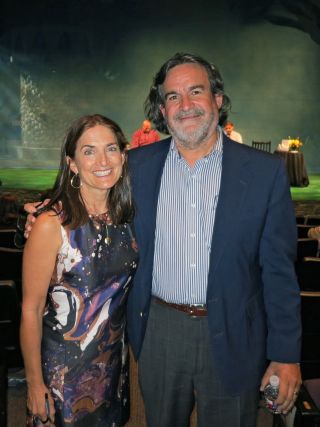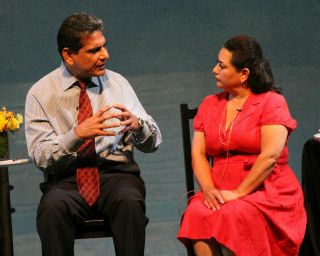Depression
Shared Experience of Depression Heals Two from Two Cultures
Decidí Vivir, the Spanish translation of Struck by Living, launched this week
Posted October 30, 2014
Four years ago, Andrés Correa clicked on a radio and listened to a woman speak about her experience with depression, suicide attempts and recovery. That first coincidence set in motion a cascade of events that led to the publication of Decidí Vivir, celebrated this week in Dallas. The woman described how depression felt, the illogical logic of a brain turned against itself. This woman was not like his mother in many ways, from a different country, raised with a different language, with friends and experiences no one would pair. Yet their experience of depression matched. Andrés picked up the phone and called his father Jorge, who downloaded the woman’s book. Jorge translated this book, page by page into his wife's native Spanish to make it easier for her to understand in her depressed state.
The voice on the radio was mine.

Julie Hersh with Jorge Correa
Jorge Correa’s work that transformed Struck by Living into Decidí Vivir is detailed in “A Translator and a Life Saver.” We celebrated the publication of Decidí Vivir this week with good food, a little wine, old friends, new friends and complete strangers. Our panel, all North Texas residents, hailed from everywhere except Texas: Dr. Ahmad Raza, (born in Pakistan, the psychiatrist that heads the inpatient unit at Zale Lipshy, UT Southwestern where both Jorge’s wife and I were treated), Dr. Abel Tomatis (a bilingual psychologist specializing in adolescent care whose Argentinian parents taught him Spanish), Jorge Correa (born in Chile, Director of Community Service and a Spanish teacher from St. Mark’s School of Texas) and me (born in the United States, but in Rhode Island, another country when compared to the Lone Star State). Ana Cristiana Reymundo (born in Mexico, Editor of Nexos Magazine, award-winning journalist, speaker of seven languages, merger of culture extraordinaire) moderated the panel.

Julie Hersh, Dr. Abel Tomatis, Jorge Correa, Dr. Ahmad Raza and Ana Cristina Reymundo
Dr. Madhukar Trivedi from UTSW (born in India), a world-renowned expert on depression, closed the Q&A from the audience with an astute observation. His message distilled: Even though a person with depression has the chance at an exceptional quality of life with the right treatment, many people fear depression more than diseases like cancer or diabetes.
Fear causes people to ignore symptoms and delay getting help, leaving most mental illness treated in a critical care state. Everyone knows it’s easier to treat a cold than pneumonia, but we have not accepted that approach with our brains. Life transitions, trauma, lack of sleep/exercise/social support, poor nutrition and the cumulative impact on an overstimulated, overpacked life, can run down a brain just like these experiences can deteriorate a heart or immune system. As Dr. Raza said: “Depression does not come from one place.”

Dr. Ahmad Raza and Ana Cristina Reymundo
Mental health does not come from one place either, but boring bits of self-care that meld into a whole. This responsibility can seem overwhelming, but the critical point is to try. Occasionally, those efforts are rewarded with something unexpected: a new friend at the track, an light beam of insight offered by a psychologist, a medication prescribed or procedure that removes the shackles of a negative mind. The possibility of health awaits, but requires a series of small steps that at times appear to lead nowhere before moving forward. There is no single-pill solution or fail-safe guarantee.
Sometimes, however, our steps bestow gifts we never envisioned. Imagine if four years ago, when I exited the radio interview, you asked me, “Do you realize that interview will lead to a Spanish translation of your book?” I would have looked over my shoulder, certain you were speaking to someone else. That one step, done blindly in the hope that it might help someone, has enlightened my life. I’ve met new friends, laughed, deepened my friendships with old friends, and learned a new word to define the experience. Milagros. Miracles. There are lots of them. Sometimes I just have to open my eyes to see.
For the curious, here is that interview with KERA's Krys Boyd on Think! that Andrés Correa heard rebroadcast on the radio. More information is available on the Decidí Vivir and Struck by Living websites.


